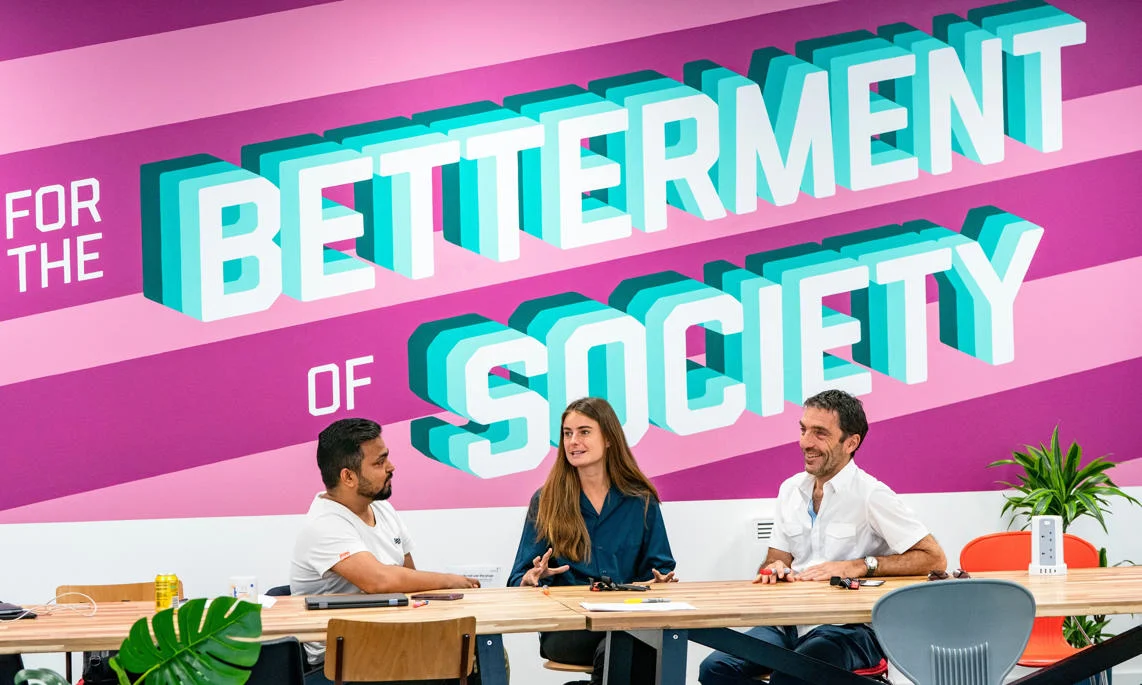Overview
Introduction
This Executive MSc takes a focused approach to business education, putting social purpose and social entrepreneurship at the heart of your learning. Offering an alternative to MBA study, our programme prepares you to become an impact-driven leader, while you continue working full-time anywhere in the world.
Guided by LSE faculty expertise in philanthropy, social enterprise, public and not-for-profit sectors, you’ll build the knowledge, skills and entrepreneurial mindset to develop your career in social business, social enterprise and impact investing.
Our Executive MSc covers core business principles within wider social, political and economic contexts. You’ll complete a social entrepreneurship project, with the chance to develop and pitch a social business proposal to a panel of experts and apply your learning in a real-world context.
Who is this programme for?
This Executive MSc provides excellent preparation for:
- starting your own social venture or social enterprise
- leading corporate social responsibility (CSR) and ESG teams
- transitioning to impact careers in the social sector
- advancing in social entrepreneurship or impact investing
- building purpose to your current corporate role.
The modular format means you can continue to work full-time anywhere in the world during your studies – you don’t need to relocate to London or take a career break.
LSE is ranked sixth in the world for social sciences and management (QS World University Rankings by Subject 2025), and our department is home to many world-renowned academics and researchers. So, you’ll be learning from the best.
This programme is ideally suited if you're:
- committed to social impact, not just maximising profit
- seeking specialised business education focused on social business and social entrepreneurship
- would like to study with flexibility
- looking to build a global network
- wanting to apply learning immediately.
Entry requirements
- A good Bachelor’s degree: UK 2:1 or higher, 3.5 GPA or higher, or equivalent. Select your country from the dropdown list below to find out the entry requirements that apply to you.
- A minimum of 4 years' full-time, relevant work experience. The majority of students on the programme will have 5+ years' experience.
- "Higher level" English language - IELTS or TOEFL - if you don't meet the English language requirements (see our English language requirements).
Overseas
English language requirements
The English language requirement for this programme is Higher. Read more about our English language requirements.
Competition for places at LSE is strong. So, even if you meet the minimum entry requirements, this doesn't guarantee you an offer of a place.
However, please don’t feel deterred from applying – we want to hear from all suitably qualified students. Think carefully about how you can put together the strongest possible application to help you stand out.
Programme content
Modular executive education format for working professionals
The programme is designed for full-time working professionals, so you don’t need to take a break from your career in order to study.
Teaching is conducted in four short intensive classroom modules taught at the LSE campus in London, each module being 1-2 weeks in duration. You'll need to take a maximum of six weeks out of the office to attend the teaching modules over the 12-month programme.
In between modules, you can continue to work full-time in your home location, with access to an online learning platform which will complement the in-class sessions and support your learning and assessment. The modules are designed to be directly applicable to your work, meaning that learning from the classroom can be brought back to make valuable developments and innovations in the workplace from day one.
The module dates for 2026/27 are:
- Monday 7 – Saturday 19 September 2026
- Monday 2 – Saturday 7 November 2026
- Monday 15 – Saturday 20 February 2027
- Monday 14 June – Saturday 26 June 2027
Curriculum overview
LSE is ranked as the sixth institution in the world for social science and management (QS World University Rankings by Subject 2025), and there's no better place to study social business.
In contrast to more traditional MBAs, we provide core business skills complemented by a global view of the social, political and economic context for business, as well as training in the practical delivery and evaluation of effective solutions to social problems.
An integrated series of courses will provide you with the knowledge, skills and entrepreneurial mindset to pursue a career in social business, social enterprise and impact leadership. You'll take six courses and a project:
- The first two courses will introduce you to the political economy in which the social business operates, philosophical understandings of public benefits, and the definition and measurement of social impact. You'll understand how social entrepreneurship differs from traditional business approaches.
- The middle two courses will teach the basics of building a social business, introducing rigorous skills and concepts of marketing, strategy, entrepreneurship, organisational behaviour and resource mobilisation.
- In the final two courses, you'll learn and practice applied skills – first, to critically evaluate the opportunities and challenges faced by the purpose-driven corporation, and second, to develop the skills and strategies to navigate social entrepreneurial activities in different contexts.
Real-world social entrepreneurship project
An altruistic entrepreneurship project runs alongside the courses for the duration of the programme. You'll work in a group with fellow students to develop an entrepreneurial business proposal for social impact. The project is an opportunity for real-world application of your learning and projects are designed with the potential for real-world implementation - whether launching a social venture, developing a CSR initiative, or creating an impact investment thesis.
While the courses are conceptually distinct, the modular structure is designed to teach several courses simultaneously, reflecting how the social and the business flow together in the real world. Some seminars will be taught by academics and expert practitioners in partnership, so that you can see how research is applied effectively in the workplace.
Year 1
Why study with us
The Executive MSc Social Business and Entrepreneurship is jointly run by the Marshall Institute and the Department of Management.
At the Marshall Institute, we work to improve the impact and effectiveness of private action for public benefit. By private action, we mean the activities of philanthropic foundations, social entrepreneurs, charities, NGOs and purpose-driven corporations that seek to create a positive impact in the world. Our mission is to support leaders and change-makers to maximise the impact of their work for public benefit.
Student stories
Find out more about our inspiring alumni and discover how the programme has impacted their professional journeys.
Meet the department
Our mission
Welcome to the Department of Management. Our mission is to inspire superior management practices by fostering a comprehensive understanding of individuals, teams, organisations, and markets, along with the psychological, social, political, and technological contexts that influence them.
By studying with us, you'll gain access to a world-leading centre for education and research, uniquely positioned within a world-class social science institution at the heart of a truly global city.
The environment
Join a vibrant intellectual community comprising of world-renowned faculty, astute students, dedicated and responsive professional services staff, and high achieving alumni. Through pioneering research and high-level teaching, you'll receive comprehensive, intensive, and rigorous methodological training to help you become an expert in your specialist fields.
The rich and culturally diverse learning environment at LSE’s Department of Management, won't only enrich your experience through developing a broad perspective and understanding, but also unlock an invaluable network of global peers.
Create a better world
We go beyond the boundaries of a traditional business school by integrating diverse disciplines such as economics, marketing, data, and analytics. Our comprehensive approach ensures that students gain a profound and multifaceted understanding of the business world, equipping them with the skills and knowledge to excel in a dynamic global environment.
Join us in our vision to create a better world, where a profound understanding of management drives positive change in both business and society.
Discover more about our programmes and research.
Who's who
Professor Stephan Chambers



Professor Connson Locke

Professor Jonathan Roberts

Why LSE
University of the Year 2025 and 1st in the UK in 2025 and 2026
Times and The Sunday Times - Good University Guide 2025 and 20261st in London for the 14th year running
The Complete University Guide - University League Tables 20266th in the world for the study of social sciences and management
QS World University Rankings by Subject 20256th in the world for leading the way in social and environmental sustainability
QS World University Rankings: Sustainability 2026Your application
Overview
In addition to meeting our minimum entry requirements you'll also need to submit the following with your application:
- Two references: one academic and one professional reference, OR two professional references if you've been out of university education for more than five years
- statement of academic purpose (see below for details and requirements; combined total of 900-1,000 words)
- CV or resume.
Statement of academic purpose: specific requirements
Your personal statement should persuasively explain why you want to take this programme and why you're a good fit for it. This may include your personal suitability such as career achievements and ambitions, what you hope to get out of the programme, why the programme appeals to you, your particular strengths, and what you'll contribute to the cohort and the classroom. 900-1,000 words.
We recommend that you refrain from, or limit, your use of generative AI. We're looking to hear your voice within your personal statement so that we can really understand your experience, your motivation and your past and future contributions. Generative AI can lead to generic and mistake-filled personal statements.
See further information on supporting documents
You should also ensure you have the support of your current employer to attend all of the classroom teaching modules during the programme. View the "Programme content" section above for the teaching module dates.
Please note that programme transfers within LSE aren't permitted for Executive MSc Social Business and Entrepreneurship candidates. If you've been offered a place on another graduate programme at LSE you won't be able to transfer to EMSBE, and similarly you won't be able to transfer from EMSBE to any other programme once you've been offered a place. Therefore please consider your choice carefully before submitting your application.
Programme and admissions enquiries
We encourage you to contact our Programme and Admissions Team to discuss the programme, and its suitability for your background and career goals. Email us at marshallinstitute.emsbeenquiries@lse.ac.uk.
Further questions? Please visit our dedicated FAQ section for more information.
Who attends
LSE attracts outstanding students from a diverse range of international backgrounds each year, and the Executive MSc Social Business and Entrepreneurship programme is designed to bring a variety of global perspectives to the classroom.
In recent cohorts, we welcomed students from a broad mix of geographies and backgrounds, including:
- corporate business leaders transitioning to CSR and ESG roles
- executives from the public and non-profit sectors seeking social business skills
- social entrepreneurs wishing to launch or scale-up their own socially-focused business venture
- professionals from consulting, finance and tech, pivoting to purpose-driven careers.
The programme is designed for working professionals with at least four years’ experience in any industry. We provide an opportunity for executives from around the world to bring their talent to the classroom to form a close community of like-minded peers, and graduate as a potential cohort of global leaders in the field of social business.
Find out more about our students in the "Why study with us" section above, under "Student stories”.
When to apply
Applications for this programme are considered on a rolling basis. This means that applications will close once the programme is full.
There is no fixed deadline. However, we encourage you to apply as early as possible to avoid disappointment.
Fees and funding
The table of fees shows the latest tuition fees for all programmes.
You're charged a fee for your programme. Your tuition fee covers registration and examination fees payable to the School, lectures, classes and individual supervision, lectures given at other colleges under intercollegiate arrangements and, under current arrangements, membership of the Students' Union. It doesn't cover fieldwork, travel or living costs in London.
Home
Home student fee
The fee above is for 2026/27.
There's a pre-registration fee of £2,500 to gain early access to online programme materials (this will be deducted from the overall tuition fee).
The tuition fee for this programme covers:
- tuition
- course materials
- some meals and events in London
Please note that travel and accommodation for the London teaching modules aren't included in the fee.
There's an instalment payment plan available to pay your fees once you’re a registered student, which spreads the cost of the programme over the year. Each instalment payment is roughly one third of the overall fees. Please get in touch with us at marshallinstitute.emsbeenquiries@lse.ac.uk if you have any questions.
Overseas
Overseas student fee
The fee above is for 2026/27.
There's a pre-registration fee of £2,500 to gain early access to online programme materials (this will be deducted from the overall tuition fee).
The tuition fee for this programme covers:
- tuition
- course materials
- some meals and events in London
Please note that travel and accommodation for the London teaching modules aren't included in the fee.
There's an instalment payment plan available to pay your fees once you’re a registered student, which spreads the cost of the programme over the year. Each instalment payment is roughly one third of the overall fees. Please get in touch with us at marshallinstitute.emsbeenquiries@lse.ac.uk if you have any questions.
Learning and assessment
How you learn
How you're assessed
Courses will be assessed through a variety of methods including:
- research papers analysing social impact and social enterprise models
- presentations pitching social business proposals
- essays and exams helping you consolidate learning from class
- group work with an emphasis on integrated assignments that help students understand how to put into practice the various components of effective management and social impact delivery.
The entrepreneurial project will be assessed through a mixture of group presentations, creation of a business proposition and an extended essay. You can view indicative details for teaching and assessment methods and contact hours for each course in the course guides listed in the Programme Regulations.
Graduate destinations
Overview
Career outcomes in social impact
This programme has been designed to give you the platform to become a leader in social business. You'll have opportunities to develop the knowledge, skills and networks to pursue a broad range of career paths aligning to your goals, including:
- social venture creation - launching your own entrepreneurial venture, for example developing and leading a profit-making business to create positive social impact
- corporate social responsibility leadership - progressing your career in the private sector, for example managing your company’s corporate social responsibility (CSR) or ESG function, or running socially-focused "intrapreneurial" projects for a profit-making firm
- social sector leadership - playing a leadership role in the public or not-for-profit sectors, for example with a socially-focused charity, NGO, think tank or impact investment fund
- career transitions – moving from traditional corporate roles to purpose-driven positions in social innovation and impact-driven business.
Social business and social entrepreneurship are emerging fields, with new opportunities developing every day as businesses across all industries globally start to catch up with this growing movement. Explore impact career fields currently available across the sector.
Our graduates have gone on to make a lasting impact in a variety of sectors and industries, from top-level corporations, venture capital funds, charities, government agencies, to foundations, social ventures, and start-ups. Transitioning into impact leadership roles, they occupy senior positions such as CEOs, CFOs, VPs, founders and directors of social enterprises and impact organisations.
We'll help you achieve your ambitions through one-to-one discussions, connections and introductions to key players in the social impact space.
Join a global network of impact leaders
By joining the programme, you'll become a part of the Marshall Institute’s lifelong community of global impact leaders. LSE’s global alumni network is almost 240,000 strong, and we’re proud that our alumni community includes business leaders, heads of state and Nobel laureates.
Read our alumni stories and find out where your executive master's degree could take you.
Further information on graduate destinations for this programme
Career support
LSE Careers
You'll have access to LSE Careers, a resource designed to enhance your employability and help you stand out. LSE Careers maintains strong connections with top-tier employers across various industries.
The Professionals at LSE programme specifically supports LSE students with five or more years of work experience, with a number of hybrid events, online resources, and access to one-to-one guidance from careers consultants.
Alongside the LSE Careers service, you'll be supported by our academic team at the Marshall Institute, and will gain access to our wide network of practitioners and experts in the social impact field.

